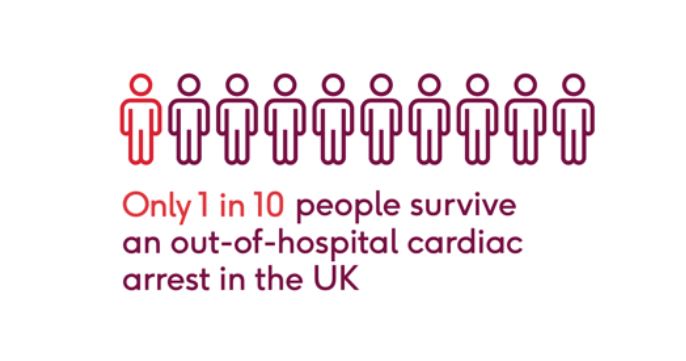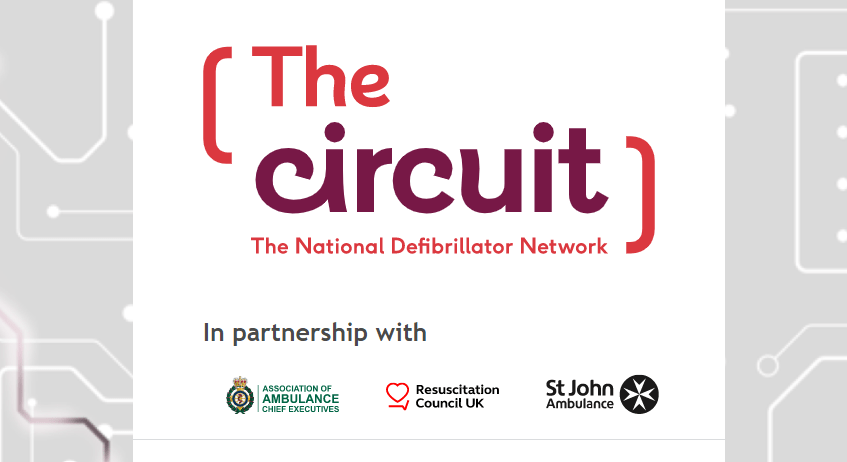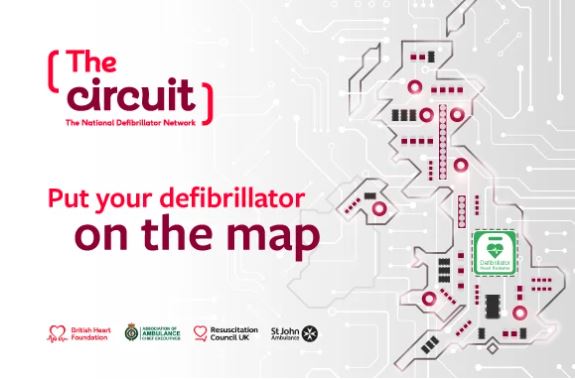Life saving public access defibrillators used in less than one in ten cardiac arrests – as tens of thousands remain unregistered.
Accordingly, leading charities and health organisations are urging defibrillator owners to register their devices on a new national database, called The Circuit, which could help save thousands of lives from cardiac arrests in the coming years.
There are more than 30,000 out of hospital cardiac arrests every year in the UK, but fewer than one in ten people survive. Every minute that passes without CPR or defibrillation reduces the chances of survival by up to 10 per cent in some instances, but immediate CPR and defibrillation can more than double the chances of survival.

The British Heart Foundation (BHF), Resuscitation Council UK (RCUK) St John Ambulance and Association of Ambulance Chief Executives (AACE), warn that the UK’s low survival rate is likely to be in part because public access defibrillators are used in less than one in 10 out of hospital cardiac arrests.
This is often because 999 call handlers aren’t always aware that a defibrillator is available nearby because the ambulance service hasn’t been told about it. If they don’t know it is there, they can’t direct someone at the scene to retrieve it while waiting for the ambulance to arrive.
To help save more lives, the BHF, RCUK, St John Ambulance and AACE are urging people who look after defibrillators in places such as offices, communities, shopping centres and leisure centres, as well as in public places, to register them on a pioneering database called The Circuit: The national defibrillator network.
While the 14 ambulance services have previously had their own regional databases, The Circuit will eventually replace these with a new national database that lets the ambulance services see defibrillators across the UK once it has been rolled out. This will allow them to direct people to the nearest defibrillator when somebody is having a cardiac arrest, wherever they are.
The Circuit, which is already live in 12 of the 14 ambulance service regions across the UK and will become nationwide soon, could help to save thousands of lives – but it is vital that as many defibrillators as possible are registered on the database for it to work effectively.
Those who own and maintain defibrillators, also called defibrillator guardians, can still register their devices in areas that are not yet live on The Circuit, ready for when their ambulance services come online.
It is estimated that there are tens of thousands of defibrillators which are still to be registered on the new system. To make sure opportunities to save lives aren’t being missed, the organisations are aiming to see 70,000 additional defibrillators unknown to The Circuit registered by the end of the year.
The rapid use of CPR and a defibrillator last weekend following the collapse of a spectator at a Premier League match, as well the prompt treatment for Danish footballer Christian Ericksen when he experienced a cardiac arrest during the Euros in the summer, have both underlined the vital importance of knowing where the nearest defibrillator is.
Father of two Ripon Danis, who now lives in Leamington Spa, wouldn’t be here today if it were not for a defibrillator. Public Health Officer Ripon had just finished a Muay Thai class while living in London in November 2018 when he had a cardiac arrest on his way home aged just 37. He said:
“I was in the best shape of my life before my cardiac arrest. I exercised regularly and watched what I ate, I felt invincible. That’s why I never thought I would have a cardiac arrest.
“I was fortunate that a passerby acted quickly and ran to get a defibrillator from the station while another person started giving me CPR. But I was one of the lucky ones. If it weren’t for a defibrillator and CPR, not only would I not be alive, but I wouldn’t have gone on to have my second daughter.
A defibrillator and CPR ultimately saved my life, and I dread to think what the outcome would have been if there wasn’t a defibrillator nearby.”
Dr Charmaine Griffiths, Chief Executive of the British Heart Foundation, said:
Every second counts when someone has a cardiac arrest and, alongside CPR, prompt use of a defibrillator is critical in giving them the best chance of survival. To put it simply, knowing where the nearest defibrillator is could be the difference between life and death.
The Circuit is pioneering technology which will help emergency services direct bystanders more quickly to a defibrillator when someone collapses with a cardiac arrest. But for The Circuit to save lives, it is vital that the tens of thousands of unregistered defibrillators across the UK are put on the system.
If you, or somebody you know is a defibrillator guardian, then we urge you to register your device on The Circuit. You could help save a life.
Dr James Cant, Chief Executive Officer at Resuscitation Council UK, said:
A cardiac arrest can happen to anyone, anywhere, at any time. Not only is defibrillator use a crucial step in the Chain of Survival, the presence of defibrillators in public places can help raise awareness and stimulate people to think about what they would do in an emergency.
Survival depends on all links in the Chain of Survival being carried out quickly. This means early recognition and calling for help, early CPR, early defibrillation and post resuscitation care – and The Circuit plays a vital role in giving people their best chance of surviving a sudden cardiac arrest.
James Radford, Director of Strategy and Communications at St John Ambulance, added:
First aid, including CPR and early defibrillation, saves lives so we’re proud to be working with our partners to help ensure all defibrillator locations are known to the ambulance trusts and accessible when someone is in cardiac arrest.
If you are the guardian of a defibrillator, please log its location on The Circuit – it’s quick and easy to do. We’d also like our existing customers and those who are buying a defibrillator from us for the first time to register this vital equipment on the database as soon as possible.
Managing Director of the Association of Ambulance Chief Executives Mr Martin Flaherty OBE, QAM said:
Calling 999 and being able to give CPR and early defibrillation can make all the difference in an emergency. The Circuit provides a national database of information and will help ensure the benefits of defibrillators are maximised and more lives saved.
Health Minister, Maria Caulfield said:
We have all seen how important it is to have quick access to a defibrillator in the event of a cardiac arrest.
With the coordination of the emergency services, and the support of the public, this new national database could help save many thousands of lives. If you are the guardian of a defibrillator, do your bit and register it on The Circuit.
Professor Stephen Powis, national medical director for NHS England, said:
Access to a defibrillator, along with initial recognition of symptoms, early CPR and post resuscitation care can mean the difference between life and death for a person who is going into cardiac arrest.
The NHS is aiming to triple the out-of-hospital cardiac arrest survival rate and properly registering the details of defibrillators is vital so ambulance services can quickly locate and deploy them when needed.
It’s free to register your defibrillator onto The Circuit, and you only have to do it once. You can also register multiple defibrillators if you are the guardian to more than one.
Visit TheCircuit.UK for more information or to register your defibrillator.


